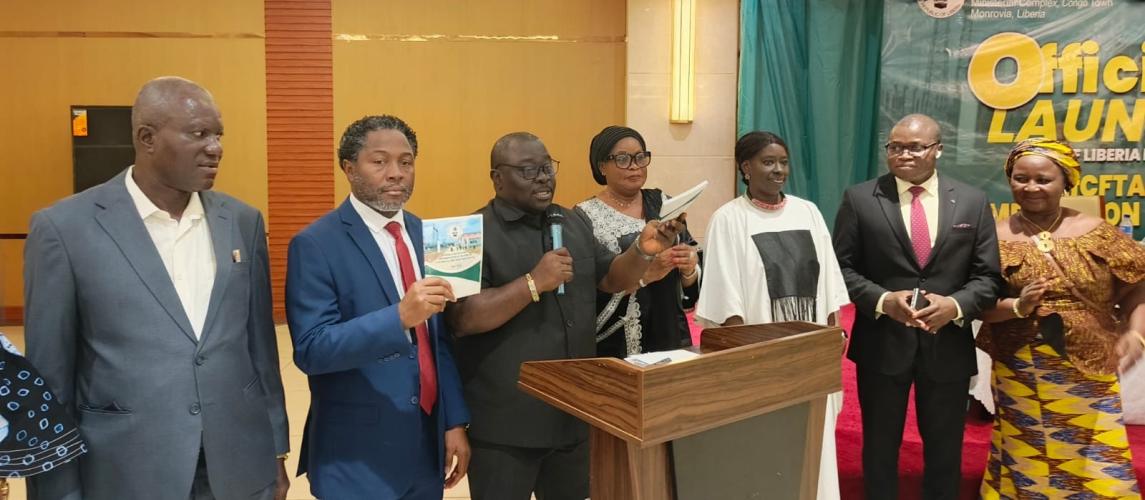
Liberia Unveils AfCFTA Implementation Strategy
The Ministry of Commerce & Industry (MoCI), in collaboration with the United Nations Economic Commission for Africa (UNECA), and the United Nations Development Programme (UNDP), has successfully launched the Liberia National AfCFTA Implementation Strategy.
The exercise, dominated with calls for collaboration in making the initiative a resounding reality took place at the EJS Ministerial Complex in Congo Town, Monrovia on 14th August 2025.
Launching the program, the Senate Committee Chairman on Commerce & Industry, Alex J. Tyler described the idea as a milestone that reflects months and past years of hard work, deep conversation and above all, a shared vision for what Liberia can, and must become in the coming years.
The Bomi County Senator noted that what makes the launch of the AfCFTA Implementation Strategy exceptionally important is that it does not just represent another paperwork, but an undertaking that will open doors of opportunities for every Liberian entrepreneur, farmer and young graduate with the dream to trade beyond the country.
“Imagine 54 African countries representing 1.3 billion people- a combined GDP of over 3 trillion dollars committing to create a single market for goods and services, allow the free movements of people and capital and ultimately position Africa as competitive in the global economy,” Senator Tyler observed. He added that with AfCFTA, Small and Medium -Sized Enterprises- the true back bone of the Liberian economy stands to be empowered through the breaking down of trade barriers and harmonized standards.
He said AfCFTA represents more than a treaty, but an opportunity to redefine Liberia’s economic future.
Senator Tyler hailed UNECA, UNDP and other partners for their collaboration and support to Liberia. He also commended the Senior Management Team at the Ministry of Commerce & Industry for its efforts and hard work-pledging the Liberian Senate’s collaboration.
In a special statement, the Minister of Commerce & Industry, Magdalene E. Dagoseh, said the occasion was more than just unveiling of a document, but Liberia’s collective commitment to a vision –one that sees Africa not as of isolated markets, but as a single, dynamic economic bloc with vast potential.
She also described the initiative most ambitious integration efforts in the world and that she was honored to be a part of such transformative journey. “This implementation strategy document lays the foundation for how our country will engage with the AfCFTA framework,” she said. Minister Dagoseh noted that the idea also reflects Liberia’s national priorities, economic aspirations and unwavering belief that trade, when inclusive and well-managed, can be a powerful engine for development, innovation and job creation.
Minister Dagoseh mentioned that the newly launched strategy outlines how Liberia will engage with the AfCFTA framework, reflecting national priorities, economic aspirations, and the belief that an inclusive, well-managed trade can drive development, innovation, and job creation, etc. Minister Dagoseh commended the UNECA, UNDP and other international and local partners for their collaborative efforts
Also speaking, the Director of the UNECA’s Sub-regional Office for West Africa, Ngone Diop, said Liberia’s blueprint for its transformation-the ARREST Agenda for Inclusive Development (AAID-2025-2029) sets the course for transformative growth, leaving no one behind. Mrs. Diop also described the National AfCFTA Implementation Strategy as a key catalyst to achieving the ARREST Agenda.
She observed that with 54 signatories and 48 ratifications, including Liberia, AfCFTA is one of the most ambitious regional integration efforts on the global stage. ‘It is more than a trade agreement; it is a framework for a new era of development- requiring strong political will and full stakeholder’s cooperation, “Madam Diop pointed out.
The UNECA /SROWA director stated that the National AfCFTA Strategy defines three strategic priorities: enhancing competitiveness of Liberian businesses, investing in infrastructure and trade facilitation, and promoting exports in key sectors such as agriculture, agro-processing, and manufacturing –while empowering women, youth and persons with disabilities.
She described trade as a major driver of the Liberian economy- adding that Liberia has demonstrated its commitment by ratifying the AfCFTA Agreement, formulating its national strategy, and now officially launching its implementation. The ceremony also drew speeches from UNDP-Liberia, the Ministry of Foreign Affairs, etc.
